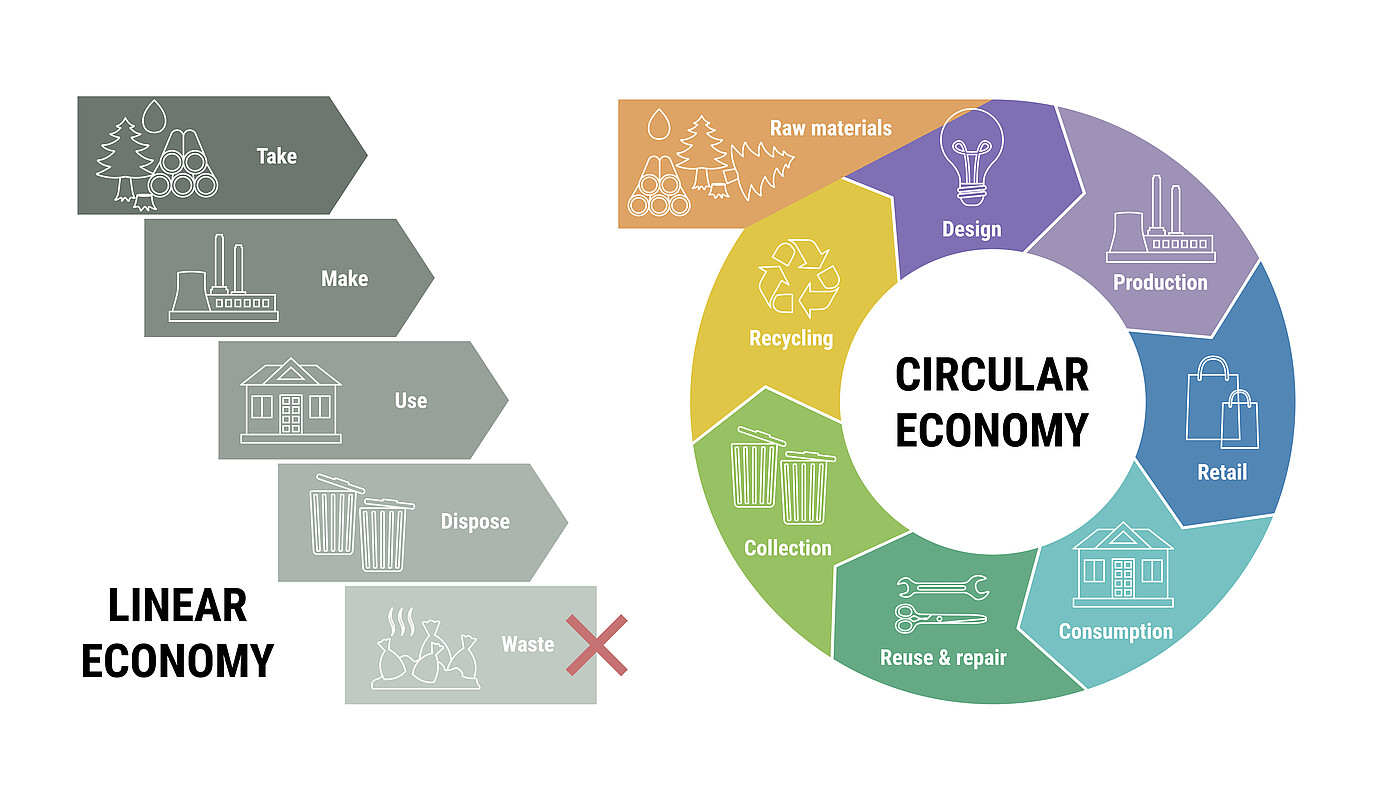

Blog: Friday, 25 February 2022
Associate professor Dr Steve Kennedy from Rotterdam School of Management and Prof. Martina Linnenluecke from Macquarie University Sydney explore the road towards managing for resilience and the circular economy – which might not be as straightforward as it would first appear. Despite good intentions, there are dangers that firms could be optimising in the wrong direction. What needs to be done? Dr Kennedy and Prof. Linnenluecke offer four key considerations of connection that begin to embrace insights from resilience thinking.
The circular economy is championed to move production and consumption systems toward sustainability and build the resilience of firms, industries, and Earth’s ecosystems. It is an approach that focuses on how material resources are used and flow through economies. Firms claim to reduce their impact on the environment while enjoying the benefits of increased resilience through circular practices of eliminating waste, using resources more efficiently, and increasing the time resources spend within the economy. Yet, this might not be as straightforward as it seems when we look at the insights from the field of managing for resilience.

Resilience is a multi-level concept. It considers how systems at different levels adapt or transform when faced with change. These systems can be firms, the industries they are part of or the social-ecological systems they are embedded within. Without resilience, systems are prone to collapse and are vulnerable to shocks and disturbances that cause them to lose functioning and structure. For instance, a farmer growing only one crop will be highly vulnerable to any disease that impacts that crop. Managing for resilience entails ensuring that systems maintain the capacity to adapt in the face of change and are still able to operate. Yet, resilience may not be a good thing – especially if it is deteriorating the resilience of other levels. For instance, a highly resilient fossil fuel industry weakens the resilience of our Earth systems as it pushes them closer to critical tipping points. In these examples, ‘resilience thinking’ calls for systems to have the ability to proactively transform.
Curiously, resilience has, so far, been largely absent from discussions about the circular economy. By overlooking resilience, circular economy practices may be pursued in ways that are ineffective at strengthening the ability of firms, industries, and social-ecological systems to manage for shocks and disturbances. Moreover, these practices may even be harming the capacity of actors to ably adapt and transform.
Circular economy research and practice needs to begin to embrace insights from resilience thinking. To open the door, we offer four key considerations of connection:
The circular economy offers excellent opportunities to move us away from critical environmental tipping points such as loss of biodiversity and changing the use of land. By reducing the demand for new virgin materials, companies have the option to leave pristine ecosystems intact and restore natural environments that have been exploited. For instance, a forestry company could rewild part of its land. Yet do firms respond this way?
Companies that eliminate waste will likely benefit from efficiency savings, savings that can be passed to the customer and raise the demand for the product. This is known as ‘Jevons Paradox’ – that efficiency enables growth. A cheaper price of wood makes it a more viable option for other uses, and the forestry company continues to work at maximum production. This may have overall benefits if wood is replacing a more unsustainable alternative, but it may also simply drive up overall consumption. Worse still, the company may choose to use the land for other economic purposes instead such as cattle ranching, and that could even be more destructive than its previous purpose.
The circular economy discourse is too readily ignoring the actual impact on the natural environment and how firms in agriculture, forestry, fisheries, mining respond to changes towards the circular economy. Urgent attention is needed to discover when circular initiatives create the envisioned positive impact and how desired responses from extractive industries are achieved.
Central to the philosophy of the circular economy is the elimination of waste. Firms need to do more with less, finding resource savings in the ways they produce goods and deliver value to customers. By reducing dependency on raw materials, a firm may be more resilient to supply shortages and volatility of prices. But could the drive for efficiency leave firms more vulnerable to shocks?
By migrating to optimised ways of doing things, firms reduce the diversity and redundancy available for when things go wrong. Selling only the most resource-efficient product leaves no alternatives if there is a sudden fall in demand. Getting rid of the unused vehicle leaves no back-up transport if there are accidents or breakdowns, and getting rid of machinery reduces the range of current and future products that could be offered. Firms need to be conscious of this tension and actively manage it to avoid being left brittle and decapacitated in the face of disruptions.
One approach is to establish partnerships that facilitate exchange of resources in times of adversity, or creating a shared pool of resources (e.g., fleet sharing arrangements). For these to work well, partners must be different enough not to experience the same stresses at the same time.
As firms convert linear economy operations to circular ones, they face the danger of optimising the wrong way of doing things. For instance, a firm may succeed in improving the circularity of agriculture by using food waste from supermarkets as its inputs. but then the firm has created a dependency on an industry that creates waste.
Likewise, firms that sell refurnished and remanufactured products are dependent upon the flow of new products being produced and consumed. This can result in firms wanting industrial systems to not change radically. Radical change, such as if an industry finds a way to offer its value to the customer without a physical product, then leaves the remanufacturing firm with no material for its input.
By creating value from waste, these types of initiatives may also have the effect of providing legitimacy to the current ways of doing things, and remove the pressure and the incentives for radical redesigns that could eliminate the waste stream altogether. Firms need to be conscious of how they become dependent on suboptimal production and consumption systems and lock in industries even further. Companies need to find ways in which they can maintain the capacity to adopt radically new ways of working, and to help industries transform and find solutions that address root causes of material usage and waste.
Closing resource loops requires firms to become more interconnected. Waste from one firm becomes the food of another. This can have great benefits for the resilience of firms and industries because information and resources can travel quickly and effectively to where it is needed at times of disturbances.
And yet, high levels of interconnectedness and tight coupling between firms and across industries may also have their downsides. Shocks and disruptions may spread more quickly and further expose firms to a greater range and frequency of problems. Product faults, production delays or physical disruptions (e.g., extreme weather impacts) in one industry can have ripple effects and widespread impacts. Firms need to pay attention to their network’s configurations. In fact there are techniques for mapping and modelling networks that can be used to help managers understand how their connectivity impacts their capacities for adaptation and their vulnerability to risks. Managers can seek to ensure ‘good’ redundancy in their partner exchanges, and can create modular network structures with the capability of closing off connections to stop the transmission of shocks.
The circular economy offers much potential to improve the resilience of firms, industries and social-ecological systems. Yet, these benefits are being far too readily assumed. Realising them will require conscious management for resilience to ensure pitfalls are avoided and the circular economy’s full potential is achieved.


Science Communication and Media Officer
Rotterdam School of Management, Erasmus University (RSM) is one of Europe’s top-ranked business schools. RSM provides ground-breaking research and education furthering excellence in all aspects of management and is based in the international port city of Rotterdam – a vital nexus of business, logistics and trade. RSM’s primary focus is on developing business leaders with international careers who can become a force for positive change by carrying their innovative mindset into a sustainable future. Our first-class range of bachelor, master, MBA, PhD and executive programmes encourage them to become to become critical, creative, caring and collaborative thinkers and doers.
